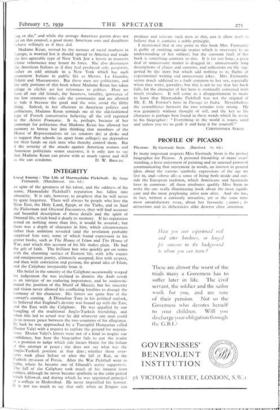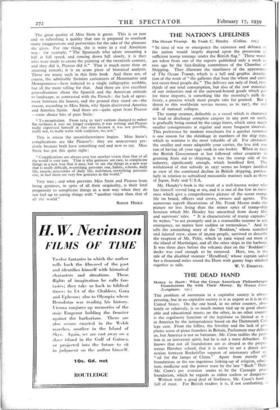PROFILE OF PICASSO
Picasso. By Gertrude Stein. (Batsford. 75. 6d.) IN many important respects Miss Gertrude Stein is the perfect biographer for Picasso. A personal friendship of many years' standing, a keen enjoyment of painting and an unusual power of communicating that enjoyment in words, an interest in general ideas about the various symbolic expressions of the age we live in, and—above all—a sense of being both inside and out- side the European tradition, which Americans and Spaniards have in common : all these attributes qualify Miss Stein to write the one really illuminating book about the most signifi- cant and the most perplexing artist now alive. And she has, in fact, written a curiously attractive, yet at the same time most unsatisfactory essay, about her favourite 1 ainter ; its attractions and its deficiencies alike deserve close attention. The great quality of Miss Stein is gusto. This is so rare and so refreshing a quality that one is prepared to overlook many exaggerations and perversities for the sake of the pleasure she gives. For one thing, she is witty in a real American way : for example, " The Spaniards who adore mounting a hill at full speed, and coming down hill slowly, it is they who were made to create the painting of the twentieth century, and they did it, Picasso did it." That is much more than an amusing remark; it is an acute piece of historical analysis.
There are many such in this little book. And there are, of course, the admirable Steinian caricatures of Montmartre and Montparnasse—here reduced to a single calligraphic scribble, but all the more telling for that. And there are also excellent generalisations about the Spanish and the American attitude to landscape, as contrasted with the French : the lack of agree- ment between the houses, and the ground they stand on—the reason, according to Miss Stein, why Spain discovered America and America Spain. And there are—quite apart from Picasso —some choice bits of pure Stein : "To recapitulate. From 1914 to 1917 cubism changed to rather flat surfaces, it was no longer sculpture, it was writing and Picasso really expressed himself in this way because it was not possible, really not, to really write with sculpture, no, not."
This is where the unsatisfactoriness begins. Miss Stein's complications are like Picasso's : they are unnecessary pre- cisely because both have something real and new to say. Miss Stein has got this quite right : " Complications are always easy but another vision than that of all the world is very rare. That is why geniuses are rare, to complicate things in a new way that is easy, but to see the things in a new way that is really difficult, everything prevents one, habits, schools, daily life, reason, necessities of daily life, indolence, everything prevents one, in fact there are very few geniuses in the world."
Very true ; and what prevents Miss Stein and Picasso from being geniuses, in spite of all their originality, is their fatal propensity to complicate things in a new way when they do not feel up to seeing things with " another vision than that of all the world." ROGER HINKS.











































 Previous page
Previous page